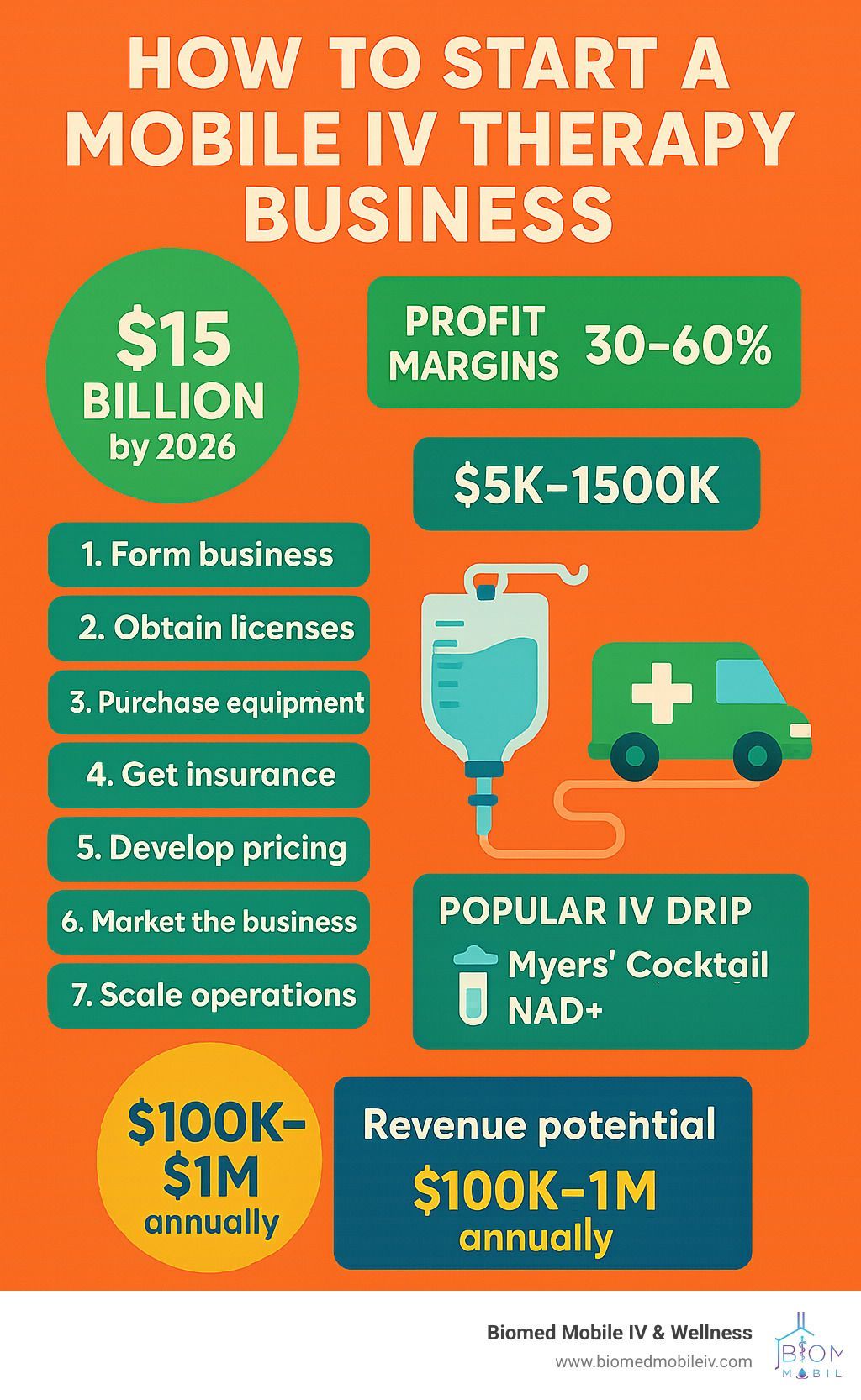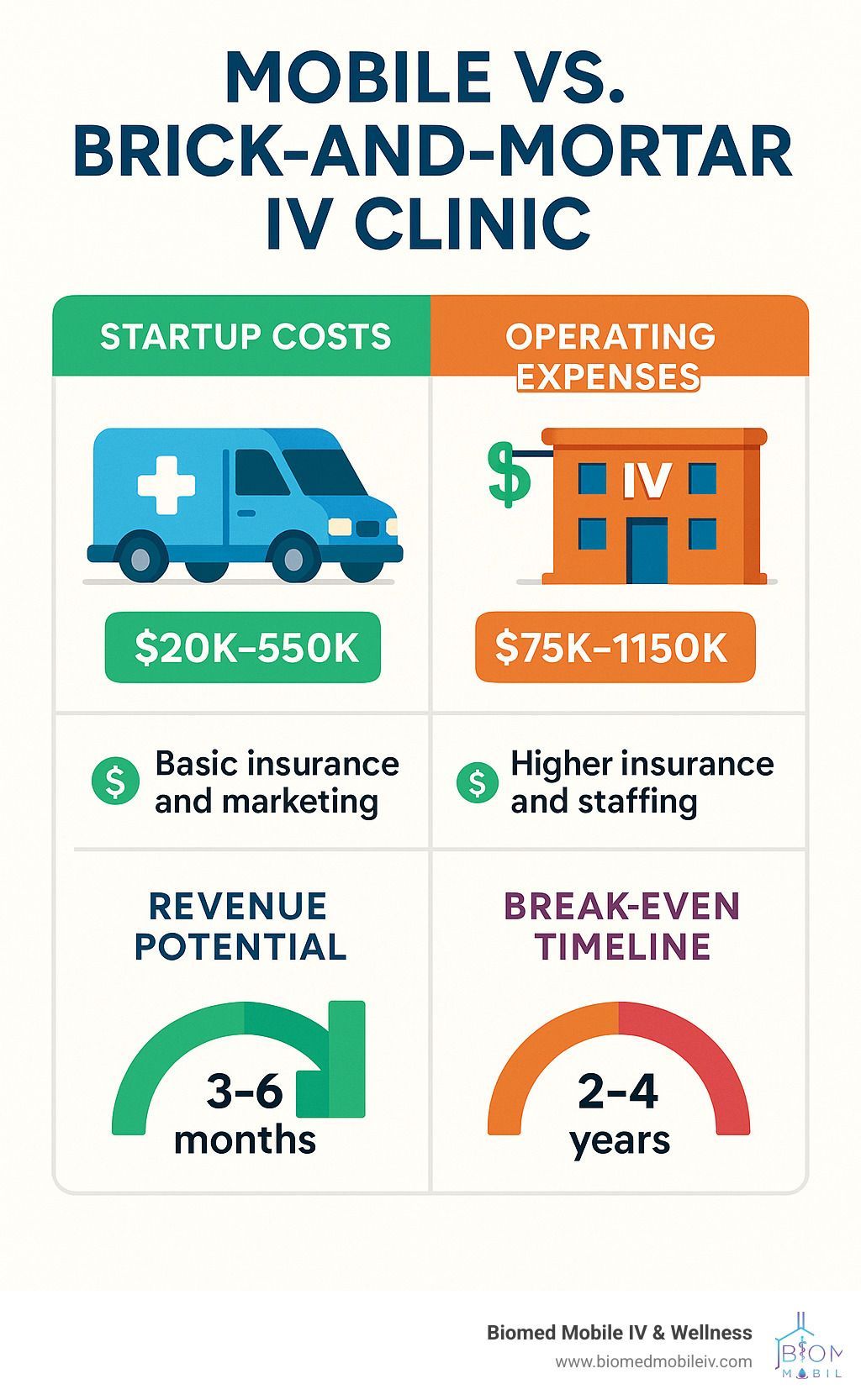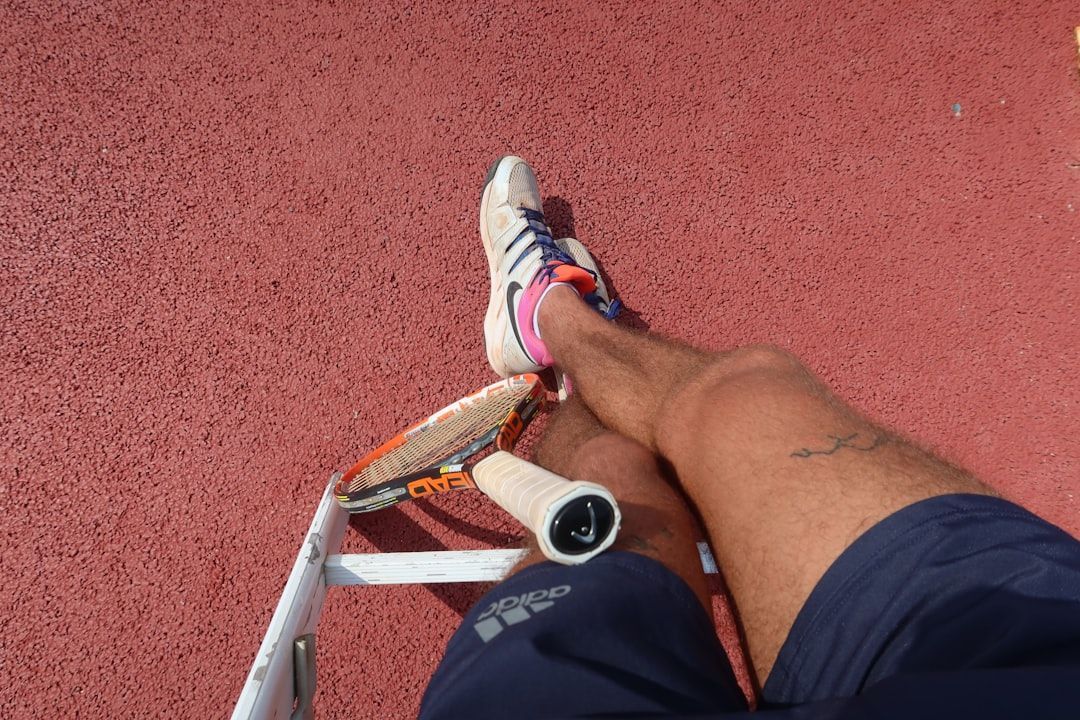IV Got This! Starting Your Own Mobile IV Therapy Business Made Easy
Why Mobile IV Therapy is Colorado's Hottest Business Opportunity
How to start a mobile iv therapy business has become one of the most searched questions among healthcare entrepreneurs, and for good reason. The mobile IV therapy industry is experiencing explosive growth, with the global IV solutions market projected to reach $15 billion by 2026. This isn't just another wellness trend—it's a proven business model with profit margins between 30-60% and startup costs ranging from just $5,000 to $150,000.
Quick Start Guide: Mobile IV Therapy Business Essentials
- Research state regulations and Corporate Practice of Medicine (CPOM) laws
- Form your business entity (LLC or Management Services Organization)
- Find a medical director for clinical oversight and compliance
- Hire licensed staff (RNs, paramedics with IV certification)
- Obtain equipment and supplies (IV pumps, fluids, mobile setup)
- Secure insurance (malpractice, general liability, commercial auto)
- Develop pricing strategy ($100-$400 per session with $10 supply costs)
- Launch marketing efforts (local SEO, partnerships, social media)
- Implement technology systems (scheduling, EHR, payment processing)
- Scale operations (additional staff, service expansion, new territories)
The demand is real. From busy professionals battling dehydration and brain fog to athletes seeking rapid recovery, mobile IV therapy delivers 100% nutrient absorption directly to clients' homes, offices, or events. Popular services include Myers' Cocktails for energy, NAD+ for anti-aging, and custom blends for autoimmune support—all delivered with hospital-level expertise in the comfort of familiar surroundings.
I'm Travis Sugg, founder of Biomed Mobile IV & Wellness, and I've spent over a decade as a firefighter and paramedic before launching my own mobile IV business serving the Denver metro area. My hands-on experience with emergency medicine and how to start a mobile iv therapy business gives me unique insights into both the clinical and entrepreneurial sides of this growing industry. Let me walk you through exactly how to build your own profitable mobile IV therapy business from the ground up.

Mobile IV Therapy 101: Definition, Demand & Profit Potential
When you're learning how to start a mobile iv therapy business, understand what sets this industry apart from traditional healthcare services. Mobile IV therapy brings hospital-level intravenous treatments directly to clients wherever they are—whether that's their home, office, hotel room, or event venue. The game-changing difference? Unlike oral supplements that lose significant potency through the digestive process, IV therapy delivers vitamins, minerals, and medications with 100% bioavailability straight into the bloodstream.
The financial opportunity here is genuinely exciting. The global IV solutions market has reached $15 billion and continues growing at 8% annually. Here's what makes this particularly compelling: over 70% of Americans already invest in supplements, but they're only absorbing a fraction of what they consume orally—sometimes as little as 20%. Mobile IV therapy solves this absorption problem while delivering the convenience that today's busy professionals and health-conscious consumers desperately want.
From a business perspective, the numbers are equally impressive. Well-operated mobile IV therapy businesses generate annual revenues ranging from $100,000 to over $1 million, with profit margins consistently hitting 30-60%. The math really is straightforward: typical sessions range from $100-$400, while supply costs per infusion average just $10. When you consider that a single nurse performing just two mobile sessions daily can gross $175,000 annually with a 35% margin, you start to see why entrepreneurs are flocking to this space.
The market demand spans multiple customer segments that continue expanding. While hangover relief remains popular (especially in college towns and urban areas), we're witnessing explosive growth in wellness applications. Immunity boosting during flu season, athletic recovery for weekend warriors, beauty treatments for anti-aging enthusiasts, and chronic illness support for autoimmune conditions represent the fastest-growing segments.
At Biomed Mobile IV & Wellness, we serve busy professionals across the Colorado Front Range who need energy optimization, athletes requiring rapid recovery, and individuals managing conditions like lupus, rheumatoid arthritis, and multiple sclerosis. The autoimmune support market alone represents a massive opportunity, as these patients often struggle with nutrient absorption and benefit tremendously from direct IV delivery.
More info about What is Mobile IV Therapy?
Scientific research on IV hydration benefits
Types of IV Therapy & Popular Drips
Understanding different IV formulations becomes crucial when you're building a successful mobile practice. Each blend targets specific health goals and customer needs, which directly impacts your pricing strategy and market positioning.
The Myers' Cocktail remains our gold standard—a carefully balanced blend of B vitamins, vitamin C, magnesium, and calcium that supports energy, immunity, and overall wellness. We've found this appeals to the broadest customer base and serves as an excellent entry point for new clients. It's reliable, well-researched, and delivers consistent results that keep customers coming back.
NAD+ therapy represents the premium end of our service spectrum, targeting anti-aging and cognitive improvement. This cutting-edge treatment commands higher prices ($400-$1,000 per session) and attracts affluent clients seeking the latest in wellness technology. The profit margins here are exceptional, and the client base tends to be highly loyal.
Glutathione infusions focus on detoxification and skin brightening, making them incredibly popular among beauty-conscious clients and those dealing with oxidative stress from chronic illness. We've seen particular success with this formulation among professionals dealing with high-stress environments and environmental toxins.
Immune boost cocktails combine high-dose vitamin C, zinc, and B-complex vitamins. These see predictable seasonal spikes during cold and flu season but remain popular year-round for preventive care. They're also excellent for corporate wellness programs and group bookings.
Athletic recovery blends include amino acids, electrolytes, and anti-inflammatory compounds. These formulations are perfect for partnering with gyms, sports teams, and fitness events. The recurring revenue potential here is substantial, especially if you can establish relationships with local athletic organizations.
Custom formulations allow you to truly differentiate your practice by tailoring treatments for specific conditions. We've developed specialized blends for autoimmune support, migraine relief, and chronic fatigue that set us apart from competitors and command premium pricing.
The key strategy is starting with proven formulations and expanding based on your specific market's needs. Track which drips perform best in your area and adjust your inventory accordingly—this data becomes invaluable for scaling your operations.
More info about Understanding the Different Types of IV Therapy
How to Start a Mobile IV Therapy Business: 10-Step Roadmap
How to start a mobile iv therapy business might seem overwhelming at first, but with the right roadmap, you can steer the complexities and build a thriving operation. I've guided dozens of entrepreneurs through this process, and the most successful ones follow a systematic approach that addresses both regulatory requirements and business fundamentals.
The biggest hurdle isn't competition—it's compliance. Corporate Practice of Medicine (CPOM) laws create a maze of regulations that vary dramatically from state to state. Some states welcome nurse-owned IV therapy businesses with open arms, while others require complex physician partnerships or Management Services Organization structures. Understanding these requirements upfront saves months of costly mistakes.
Your financial investment will depend on your ambitions and local requirements. A bare-bones mobile operation might cost as little as $5,000, while a comprehensive setup with multiple vehicles and premium equipment can reach $150,000. Most successful operators find their sweet spot around $20,000-$50,000, which covers essential equipment, initial inventory, licensing, insurance, and marketing without breaking the bank.
The timeline to profitability is encouraging. With focused execution, most businesses break even within 6-12 months and achieve solid returns within two years. The key is balancing quality service delivery with aggressive but sustainable marketing—even the best IV therapy won't sell itself.
Scientific research on compliance requirements
More info about Mobile IV Therapy
Step 1 — Market Research & Business Plan: how to start a mobile iv therapy business legally
Before you invest your first dollar, dive deep into your local market landscape. I've seen too many enthusiastic entrepreneurs skip this step and struggle later. Start by researching existing competitors—how many mobile IV services operate in your area? What's their pricing structure? Which services do they emphasize? More importantly, what gaps can you identify?
Target market identification makes or breaks your business model. Here in Colorado, we've built Biomed Mobile IV & Wellness by focusing on three core segments: busy professionals in Denver and Boulder who need energy optimization, athletes throughout the Front Range seeking rapid recovery, and individuals managing autoimmune conditions like lupus and rheumatoid arthritis. Each segment has distinct needs, price sensitivity, and preferred communication channels.
Your SWOT analysis should be brutally honest. Strengths might include medical background, business experience, or strong local connections. Weaknesses could involve limited startup capital, regulatory knowledge gaps, or marketing inexperience. Opportunities include underserved geographic areas, unmet customer needs, or potential partnerships with gyms and wellness centers. Threats encompass regulatory changes, new competitors, or economic downturns affecting discretionary healthcare spending.
Financial projections require realistic assumptions backed by market research. Model three scenarios: Conservative (2-3 clients daily at $200 average), Realistic (4-5 clients daily at $250 average), and Optimistic (6-8 clients daily at $300 average). Include all startup costs, monthly operating expenses, and growth investments. Banks and investors scrutinize these numbers carefully—make them defensible.
More info about business plan templates
Step 2 — Choose Entity & Ownership Structure
Business structure selection hinges entirely on your state's Corporate Practice of Medicine laws. These regulations determine who can legally own medical practices, and they vary dramatically across states. Getting this wrong can shut down your business, so invest in proper legal guidance.
Limited Liability Company (LLC) formation works beautifully in states that allow nurse ownership of IV therapy businesses. The structure is straightforward to establish, offers excellent liability protection, and provides tax flexibility. You'll file a Certificate of Formation with your state, obtain an Employer Identification Number from the IRS, and draft an operating agreement outlining ownership and management responsibilities.
Professional LLC (PLLC) requirements exist in some states for medical services. Only licensed healthcare providers can own PLLCs, but they offer similar benefits to regular LLCs with additional professional protections.
Management Services Organization (MSO) structures help steer strict CPOM restrictions. The MSO handles all business operations—marketing, scheduling, billing, equipment—while contracting with a physician-owned professional entity for actual medical services. This arrangement requires careful legal structuring and ongoing compliance monitoring.
Colorado's regulations allow registered nurses to own IV therapy businesses under proper physician supervision, making LLC formation relatively straightforward. However, each state has unique requirements, so always consult with healthcare attorneys familiar with your specific jurisdiction before making final decisions.
Step 3 — Licenses, Permits & Finding a Medical Director
Licensing requirements create one of the most complex aspects of how to start a mobile iv therapy business. At minimum, you'll need a business license from your city or county (typically $50-$300), state health department permits for medical services, and potentially DEA registration if you plan to handle controlled substances. Professional licenses for all clinical staff are non-negotiable.
The medical director requirement represents your most critical partnership. This physician provides essential clinical oversight, develops treatment protocols, ensures regulatory compliance, and serves as your safety net for complex medical situations. They don't need physical presence at every appointment but must be available for consultation and emergency guidance.
Finding qualified medical directors can be challenging, especially in competitive markets. GuardianMD specializes in remote medical director services for IV therapy businesses nationwide, handling compliance, protocols, and physician oversight for a reasonable monthly fee. This removes a major barrier for new operators.
Alternatively, build relationships with local emergency medicine physicians, family practitioners, or integrative medicine doctors. Many are genuinely interested in IV therapy partnerships but need education about the business model and their role. Offer competitive compensation and clear expectations to attract quality candidates.
Step 4 — Staffing & Training Requirements
Your clinical team determines everything—client satisfaction, safety outcomes, and business reputation. Quality nurses and paramedics transform one-time customers into loyal advocates who refer friends and family.
Registered Nurses (RNs) form your primary workforce across all states. They can perform IV insertion, medication administration, and comprehensive patient assessment. Prioritize candidates with emergency, ICU, or outpatient experience who understand both clinical excellence and customer service expectations.
Paramedics bring excellent IV skills from field experience and often adapt well to mobile environments. However, verify your state's scope of practice laws carefully—some jurisdictions restrict paramedic practice outside emergency settings, while others welcome their expertise in wellness applications.
Licensed Practical Nurses (LPNs/LVNs) can assist with IV administration under RN supervision in most states. They're cost-effective for high-volume operations and often provide excellent patient care when properly trained.
Essential certifications include current professional licensure, BLS (Basic Life Support) certification, IV therapy training, and preferably ACLS (Advanced Cardiac Life Support). Ongoing education is crucial—we provide monthly training on new treatments, safety protocols, and customer service excellence.
Consider the 1099 contractor model that many successful operators use. Nurses purchase their own supplies ($1,500-$1,800 startup investment) and earn $80-$200 per appointment. This reduces your overhead while attracting motivated professionals who treat each client interaction as their own business opportunity.
Step 5 — Equipment, Supplies & Mobile Setup
Equipment quality directly impacts both safety and efficiency. Never compromise on essential items—your reputation and client safety depend on reliable, professional-grade supplies that perform flawlessly in mobile environments.
Essential equipment includes IV pumps or gravity drip sets, IV catheters in multiple gauges (18-22), IV tubing and extension sets, sharps containers and disposal systems, blood pressure cuffs and pulse oximeters, emergency medications and equipment, and coolers for temperature-sensitive medications. Each item should meet or exceed hospital standards.
Vehicle considerations evolve with your business growth. Many successful operators start with personal vehicles and portable equipment, then transition to dedicated vans with custom build-outs. Professional setups include medical-grade storage and refrigeration, comfortable client seating, prominent branding and graphics, power inverters for equipment, and HIPAA-compliant documentation areas.
Inventory management becomes increasingly critical as you scale operations. Implement systems to track expiration dates, maintain appropriate stock levels, and automate reordering processes. Software solutions help manage complex inventory requirements while ensuring you never run out of essential supplies during client appointments.
Cold chain management is absolutely essential for temperature-sensitive medications. Invest in validated coolers and continuous temperature monitoring to ensure product integrity from storage through administration. This attention to detail sets professional operations apart from amateur competitors.
Step 6 — Pricing, Funding & Financial Forecast: how to start a mobile iv therapy business for profit
Pricing strategy requires balancing profitability with market acceptance. Research local competitors thoroughly, but don't automatically match their prices. Instead, position based on value, convenience, and quality—clients often pay premium prices for superior service and professional expertise.
Typical pricing ranges include basic hydration at $100-$150, Myers' Cocktail at $150-$250, premium NAD+ at $400-$1,000, add-on vitamins at $25-$50 each, and travel fees of $25-$75 depending on distance and service area. Supply costs average just $10-$20 per treatment, creating healthy profit margins when properly managed.
Funding options span multiple approaches. Personal savings remain the most common startup method, providing complete control without debt obligations. SBA loans work well for qualified businesses with solid business plans and collateral. Equipment financing helps spread vehicle and medical device costs over time. Angel investors interested in healthcare ventures can provide both capital and valuable guidance.
Break-even typically occurs within 6-12 months with consistent marketing efforts and quality service delivery. Plan for 12-18 months of operating expenses during the startup phase, as building client base and brand recognition takes time even in favorable markets.
Step 7 — Insurance, Policies & Risk Management
Comprehensive insurance coverage protects your business, staff, and clients while providing essential peace of mind. Operating without proper coverage is financial suicide—the risks are simply too high in healthcare services.
Essential policies include professional liability/malpractice insurance ($1,000-$3,000 annually), general liability insurance covering slip-and-fall incidents and property damage, commercial auto insurance required for business vehicle use, cyber liability insurance protecting against data breaches, and business property insurance covering equipment and supplies.
Risk management extends far beyond insurance coverage. Develop comprehensive policies for informed consent procedures, emergency response protocols, adverse event documentation, equipment maintenance and calibration, and staff background checks with ongoing training requirements. These systems protect everyone involved while demonstrating professional standards.
Emergency preparedness is absolutely crucial for mobile operations. Every unit should carry epinephrine, oxygen, and other emergency medications. Staff must know exactly when to call 911 and how to stabilize patients until professional help arrives. Regular training and simulation exercises keep these skills sharp.
Step 8 — Technology & Documentation Systems
Modern IV therapy businesses rely heavily on integrated technology for scheduling, documentation, billing, and compliance. Choose systems that scale with your growth and integrate seamlessly rather than creating data silos and workflow inefficiencies.
Electronic Health Records (EHR) systems are essential for HIPAA compliance and quality patient care. Look for solutions designed specifically for mobile healthcare with robust offline capabilities and secure cloud storage. Poor documentation creates liability and compliance nightmares.
Scheduling software should handle complex routing optimization, automated appointment reminders, real-time updates, and staff coordination. Popular options include Acuity Scheduling and SimplePractice, both offering mobile-friendly interfaces and integration capabilities.
Payment processing needs security and convenience. Offer multiple payment options including credit cards, HSA/FSA cards, and mobile payments. Seamless payment experiences encourage repeat business and reduce administrative overhead.
Telehealth integration allows medical directors to consult with patients remotely, expanding service capabilities while maintaining regulatory compliance. This technology becomes especially valuable for complex cases or emergency consultations.
Analytics and reporting help optimize operations continuously. Track key metrics like customer acquisition cost, lifetime value, service efficiency, and geographic demand patterns to identify improvement opportunities and growth strategies.
Step 9 — Marketing & Client Acquisition
Marketing determines whether your excellent service reaches paying customers. Even the best IV therapy fails without effective promotion. Allocate 10-20% of your budget to marketing activities and track results carefully.
Local SEO is absolutely crucial for mobile services. Optimize for location-based searches like "mobile IV therapy Denver" or "IV hydration near me." Claim and optimize your Google Business Profile with current photos, accurate hours, and encouraging customer reviews. This foundation drives organic findy.
Social media marketing works exceptionally well for visual healthcare services. Share compelling before/after photos (with proper permissions), educational content about IV therapy benefits, and behind-the-scenes glimpses of your professional setup. Authenticity builds trust and engagement.
Partnership marketing accelerates growth significantly. We've achieved tremendous success partnering with gyms and fitness centers for athletic recovery services, corporate wellness programs for on-site employee benefits, medical spas and wellness centers for cross-referrals, and event planners for group bookings. These relationships provide steady referral streams.
Google Ads and Facebook advertising drive immediate results when properly targeted to local audiences searching for specific symptoms or wellness goals. Start small, test extensively, and scale successful campaigns gradually.
Content marketing establishes expertise and builds trust over time. Regular blog posts about IV therapy benefits, wellness tips, and health education attract organic traffic while demonstrating professional knowledge and commitment to client education.
More info about Mobile IV Companies Near Me
Step 10 — Launch, Measure & Scale
Launch preparation involves rigorous testing of all systems before serving paying customers. Conduct mock appointments with friends or family to identify operational issues, refine processes, and build staff confidence. These practice runs reveal problems much better than theoretical planning.
Key Performance Indicators (KPIs) to track include customer acquisition cost, average revenue per client, client retention rates, appointment efficiency, and geographic service density. These metrics guide decision-making and identify optimization opportunities as you grow.
Scaling strategies depend on your market conditions and personal goals. Options include geographic expansion to new cities or regions, service expansion adding peptide therapy, weight loss programs, or specialized treatments, team growth hiring additional nurses and vehicles, and franchising for rapid multi-market expansion.
We've successfully scaled Biomed Mobile IV & Wellness across the Colorado Front Range by maintaining strict quality standards while systematically expanding our service area and clinical team. Each new market requires careful planning, local marketing investment, and community relationship building, but the results justify the effort when executed properly.
Financial Snapshot & Startup Checklist
The financial reality of how to start a mobile iv therapy business varies dramatically based on your goals and market approach. I've seen entrepreneurs launch successful operations with as little as $5,000, while others invest $150,000 in premium setups. The key is understanding what each investment level delivers.
Starting lean with $5,000-$10,000 gets you operational quickly. This minimal approach covers portable equipment, basic supplies, essential insurance, and simple marketing. You'll use your personal vehicle and focus on building clientele before expanding. Many successful operators, including myself, started this way to test market demand without major risk.
The sweet spot for most operators falls between $20,000-$50,000. This standard startup investment provides professional-grade equipment, dedicated vehicle setup, comprehensive insurance coverage, and effective marketing campaigns. You'll have sufficient inventory and working capital to serve clients professionally while building sustainable growth.
Premium startups requiring $75,000-$150,000 create immediate market presence with custom mobile units, multiple vehicles, advanced technology systems, and extensive branding. This approach works best for operators with significant business experience or those entering competitive markets where differentiation matters.
Understanding your ongoing costs is equally important. Variable costs per treatment include IV supplies ranging from $8-$15, medications and vitamins costing $5-$25, labor expenses of $25-$75, and vehicle costs around $5-$15. These directly correlate with your service volume.
Fixed monthly expenses remain constant regardless of client volume. Insurance typically costs $500-$1,500 monthly, vehicle payments or leases run $300-$800, software subscriptions average $100-$500, marketing budgets range from $1,000-$5,000, and administrative expenses add another $500-$2,000.
The math works in your favor with proper execution. At Biomed Mobile IV & Wellness, we've found that consistent service delivery with effective local marketing creates positive cash flow within 6-12 months. The key is balancing startup investment with realistic revenue projections based on your market's specific characteristics.

Funding sources depend on your chosen investment level and personal financial situation. Most operators start with personal savings, which maintains complete control and avoids debt service. SBA loans provide favorable terms for qualified healthcare businesses, while equipment financing helps spread vehicle and medical device costs over time.
Mobile operations offer significant advantages over brick-and-mortar clinics. Your overhead stays lower without rent, utilities, and facility maintenance. Client acquisition costs often decrease because you're solving the convenience problem that drives demand. However, vehicle maintenance, fuel costs, and travel time between appointments create unique operational considerations.
The comparison becomes clear when analyzing break-even timelines. Brick-and-mortar clinics typically require 18-24 months to achieve profitability due to higher fixed costs and slower initial client acquisition. Mobile operations often reach break-even within 6-12 months because lower overhead and higher convenience factor accelerate revenue growth.
Revenue scaling happens faster with mobile services once you establish market presence. Adding additional nurses and vehicles creates linear growth opportunities, while brick-and-mortar expansion requires new facility investments and longer development timelines.
Plan for seasonal variations in your financial projections. We see increased demand during flu season, summer athletic events, and holiday periods when people prioritize wellness and recovery. Building these patterns into your cash flow models prevents surprises and helps optimize inventory management.
Compliance, Quality Assurance & Patient Safety
When you're learning how to start a mobile iv therapy business, understanding regulatory compliance isn't just about checking boxes—it's about building a foundation that protects your patients, your team, and your business's future. As someone who's steerd these waters with Biomed Mobile IV & Wellness, I can tell you that getting compliance right from day one saves countless headaches down the road.
HIPAA (Health Insurance Portability and Accountability Act) forms the backbone of patient privacy protection in your mobile IV business. Every team member needs comprehensive HIPAA training before they interact with patients or handle any health information. This isn't a one-time requirement either—annual refresher training keeps everyone sharp and current with evolving privacy standards.
Your policies must cover how you handle protected health information both digitally and physically. Think about it: you're traveling to homes and offices with patient records, treatment notes, and billing information. Secure tablets, encrypted communications, and locked storage containers become essential tools in maintaining HIPAA compliance on the road.
OSHA (Occupational Safety and Health Administration) regulations keep your mobile team safe while they care for others. Bloodborne pathogen training is mandatory for anyone handling IV equipment or potentially coming into contact with blood. Your mobile units need proper sharps disposal systems, personal protective equipment, and protocols for handling exposure incidents.
The mobile nature of IV therapy creates unique OSHA challenges. Unlike fixed clinics, your team works in varying environments—from cramped hotel rooms to outdoor events. Developing safety protocols that work across these diverse settings requires careful planning and regular practice.
State health department regulations vary significantly across the country, which is why researching your specific state's requirements is crucial when planning how to start a mobile iv therapy business. Some states require special permits for mobile medical services, while others treat them the same as fixed facilities. Colorado's regulations, for example, allow RNs to provide IV therapy under physician supervision, but your state might have different requirements.
FDA regulations govern how you source, store, and handle medications and IV solutions. All products must come from licensed pharmacies or FDA-approved suppliers. Temperature-sensitive medications require validated cold storage and monitoring throughout transport. Documentation of your cold chain integrity becomes part of your quality assurance program.
Quality assurance programs demonstrate your commitment to excellence while helping identify areas for improvement. Regular audits of clinical practices, documentation accuracy, and safety procedures maintain the high standards that build patient trust and referrals.
Scientific research on supervision of a licensed healthcare provider
Best Practices & Clinical Protocols
Standardized protocols ensure every patient receives consistent, safe care regardless of which team member provides their service. This consistency becomes your competitive advantage—patients know exactly what to expect from your brand.
Patient assessment starts before you ever insert an IV. Comprehensive medical history reviews, current medication lists, and vital sign checks identify potential contraindications or complications. Never rush this step, even when patients seem impatient. It's your primary safety measure and often reveals important information that affects treatment decisions.
Informed consent must be obtained and documented before every treatment. Explain the benefits, potential risks, and alternative treatments in language your patients understand. Many mobile IV businesses use tablet-based consent forms that patients can sign electronically. This creates a clear paper trail while streamlining your documentation process.
IV insertion techniques should follow evidence-based best practices every single time. Sterile technique isn't optional—it's what separates professional medical services from wellness trends. Use appropriate catheter sizes, proper securement methods, and monitor insertion sites throughout treatment.
Monitoring protocols during treatment include regular vital sign checks, IV site assessments, and patient comfort evaluations. Mobile settings can be distracting, but maintaining clinical vigilance protects both patient safety and your business reputation.
Documentation requirements include detailed treatment records, patient responses, and any adverse events. Thorough documentation protects against liability while ensuring continuity of care. Electronic health records designed for mobile use make this process more efficient and secure.
Continuous Training & Risk Mitigation
Ongoing education keeps your team current with evolving best practices and regulatory changes. At Biomed Mobile IV & Wellness, we schedule monthly training sessions covering new treatment protocols, safety procedures, customer service excellence, and regulatory updates.
Simulation drills prepare your staff for emergency situations they hope never to encounter. Practice anaphylaxis response procedures, IV infiltration management, and other potential complications in controlled settings. When real emergencies occur, muscle memory from regular training can be lifesaving.
Insurance policy reviews should happen annually as your business grows and evolves. Work with agents who understand mobile healthcare risks and can recommend appropriate coverage levels. As you add new services or expand into new territories, your insurance needs will change accordingly.
Regulatory monitoring keeps you ahead of changes that could affect your operations. Subscribe to industry publications, join professional associations, and maintain relationships with healthcare attorneys who specialize in mobile medical services. The investment in staying informed pays dividends in avoiding compliance issues.
Risk mitigation extends beyond clinical protocols to include business continuity planning. What happens if a team member gets sick? How do you handle equipment failures? Having contingency plans in place keeps your business running smoothly when unexpected challenges arise.
Marketing Mastery & Community Outreach
Successful marketing combines digital strategies with community engagement. Mobile IV therapy is still relatively new, so education plays a crucial role in customer acquisition.
Local SEO optimization drives organic traffic from people searching for IV therapy services. Target location-specific keywords like "mobile IV therapy Denver" or "hangover IV Boulder." Create separate landing pages for each service area you cover.
Google Business Profile optimization includes:
- Complete business information and hours
- Professional photos of equipment and team
- Regular posts about services and health tips
- Prompt responses to customer reviews
- Accurate service area mapping
Social media strategy should focus on education and social proof. Share client testimonials (with permission), educational content about IV therapy benefits, and behind-the-scenes glimpses of your professional operation.
Influencer partnerships work well in health and wellness markets. Partner with local fitness influencers, wellness bloggers, and healthcare professionals who align with your brand values.

Content & Partnership Strategies
Content marketing establishes your expertise while providing value to potential customers. Regular blog posts about topics like "IV Therapy for Athletic Recovery" or "Managing Autoimmune Symptoms with IV Nutrition" attract organic traffic and demonstrate knowledge.
Educational webinars position you as a thought leader while generating leads. Topics might include "Optimizing Hydration for Peak Performance" or "IV Therapy vs. Oral Supplements: What You Need to Know."
Strategic partnerships accelerate growth:
- Fitness centers: Offer post-workout recovery sessions
- Corporate wellness programs: Provide on-site services for employees
- Medical spas: Cross-refer complementary services
- Event planners: Service weddings, conferences, and athletic events
- Healthcare providers: Receive referrals for specialized IV treatments
Partnership agreements should clearly define referral terms, service standards, and compensation structures. Successful partnerships benefit both parties and their customers.
Retention & Loyalty Programs
Customer retention costs significantly less than acquisition and drives long-term profitability. Implement programs that encourage repeat business and referrals.
Membership programs provide predictable revenue while offering customer value. Options include:
- Monthly IV packages at discounted rates
- Priority scheduling for members
- Exclusive access to new treatments
- Member-only educational events
Referral incentives leverage satisfied customers to drive growth. Offer service credits or discounts for successful referrals, but ensure compliance with healthcare referral regulations.
Email marketing maintains customer relationships between appointments. Share health tips, seasonal wellness advice, and special promotions. Segment your list based on service preferences and treatment history.
Follow-up protocols demonstrate care and identify additional service opportunities. Schedule check-ins 24-48 hours after treatments to ensure customer satisfaction and address any concerns.
Frequently Asked Questions about Starting a Mobile IV Therapy Business
Starting any healthcare business comes with questions, and how to start a mobile iv therapy business brings unique challenges around ownership, medical oversight, and risk management. After helping dozens of entrepreneurs steer these waters, I've found the same concerns come up repeatedly.
Let me address the most common questions I hear from aspiring mobile IV therapy business owners.
Who can legally own a mobile IV therapy business?
The answer depends entirely on where you plan to operate. Each state has different Corporate Practice of Medicine (CPOM) laws that determine who can own medical practices, and these rules directly impact your business structure options.
States with strict CPOM requirements only allow licensed physicians (MDs or DOs) to directly own medical practices. In these locations, nurse practitioners, physician assistants, and non-medical entrepreneurs cannot hold majority ownership. Some states permit PAs to hold minority interests, but the physician must maintain controlling ownership.
States with relaxed CPOM laws often allow nurses to own IV therapy businesses under appropriate physician supervision. Here in Colorado, for example, registered nurses can own and operate mobile IV businesses as long as they have proper medical director oversight. This makes business formation much more straightforward.
Non-physicians can still participate through Management Services Organization (MSO) structures, even in strict CPOM states. The MSO handles all business operations—marketing, scheduling, billing, equipment—while contracting with a separate physician-owned professional entity for medical services. This arrangement requires careful legal structuring and ongoing compliance monitoring, but it opens ownership opportunities for entrepreneurs without medical licenses.
Before choosing your business structure, always consult healthcare attorneys familiar with your state's specific requirements. CPOM violations can result in practice closure and significant penalties, so getting this right from the start is essential.
Do I need a medical director and how do I find one?
Yes, a medical director is absolutely required for IV therapy businesses. This isn't optional—it's a fundamental requirement for legal operation and patient safety.
Your medical director provides clinical oversight, develops treatment protocols, ensures regulatory compliance, and remains available for consultation during treatments. They don't need to be physically present for every IV session, but they must be reachable for questions and emergencies. Most importantly, they review and approve the standing orders that allow your nurses to administer IV treatments under their supervision.
Finding qualified medical directors can be one of your biggest startup challenges. Many physicians don't understand the mobile IV business model or feel uncertain about liability exposure.
GuardianMD specializes in remote medical director services for IV therapy businesses nationwide. They provide comprehensive compliance support, evidence-based protocols, and physician oversight for a monthly fee. This solution works particularly well for new operators who need immediate medical director support.
Alternatively, network with local physicians in emergency medicine, family practice, or integrative medicine. Many are genuinely interested in IV therapy partnerships once they understand the business model and safety protocols. Emergency physicians often have the most relevant experience, while integrative medicine doctors may be more familiar with wellness applications.
When approaching potential medical directors, come prepared with information about your business plan, safety protocols, insurance coverage, and compensation structure. Most physicians want to see that you're serious about compliance and patient safety before committing to oversight responsibilities.
What insurance coverage is essential?
Comprehensive insurance coverage protects your business, staff, and patients—and it's not optional. Operating without proper coverage exposes you to catastrophic financial risk that could destroy your business overnight.
Professional liability (malpractice) insurance covers claims related to patient care and treatment outcomes. Expect to pay $1,000-$3,000 annually depending on your coverage limits, location, and claims history. This protects against allegations of improper treatment, medication errors, or adverse reactions.
General liability insurance protects against non-medical claims like slip-and-fall accidents at client locations, property damage from your equipment, or other operational incidents. Mobile services face unique risks since you're working in unfamiliar environments.
Commercial auto insurance is required if you're using vehicles for business purposes. Your personal auto policy explicitly excludes business use, leaving you completely unprotected during service calls. Commercial coverage costs more but provides essential protection for your mobile operations.
Cyber liability insurance protects against data breaches and HIPAA violations. With increasing cyber threats targeting healthcare businesses, this coverage is becoming essential rather than optional. A single data breach can cost tens of thousands in notification requirements, credit monitoring, and regulatory fines.
Business property insurance covers your equipment, supplies, and other business assets against theft, damage, or loss. Mobile operations face higher risks since expensive equipment travels to multiple locations daily.
Work with insurance agents familiar with mobile healthcare risks to ensure adequate coverage. Generic business insurance agents often don't understand the unique exposures of mobile medical services. The small additional cost of working with healthcare-specialized agents pays for itself through proper coverage and claims support.
Don't try to save money by skipping coverage or choosing minimal limits. The financial risks are simply too high for a mobile healthcare business to operate without comprehensive protection.
Conclusion
The mobile IV therapy industry isn't just a trend—it's a fundamental shift toward convenient, personalized healthcare that's here to stay. With how to start a mobile iv therapy business becoming one of the most searched healthcare entrepreneurship topics, the timing couldn't be better for entering this growing market.
The numbers speak for themselves: a $15 billion market growing at 8% annually, profit margins between 30-60%, and startup costs as low as $5,000 for motivated entrepreneurs. But beyond the financial opportunity lies something deeper—the chance to make a real difference in people's lives while building a sustainable business.
What sets successful mobile IV therapy businesses apart isn't just clinical expertise or business acumen—it's the commitment to genuine care and professional excellence. Every interaction becomes an opportunity to build trust, whether you're helping a busy professional regain their energy, supporting an athlete's recovery, or providing comfort to someone managing a chronic condition.
At Biomed Mobile IV & Wellness, my journey from firefighter and paramedic to mobile IV entrepreneur has taught me that success comes from combining clinical excellence with authentic relationships. When clients see that you truly care about their wellbeing—not just the transaction—they become advocates who refer friends, family, and colleagues.
The regulatory landscape might seem daunting at first, but it's actually your competitive advantage. The businesses that invest time in proper compliance, quality protocols, and ongoing education create barriers that protect against fly-by-night operators. Your commitment to doing things right becomes a selling point that attracts discerning customers.
Every established business started with someone taking that first step. The mobile IV therapy industry is still young enough that there's room for passionate entrepreneurs who focus on quality and community. Whether you're a nurse looking to leverage your clinical skills or a business-minded individual seeking to enter healthcare, the path forward is clearer than ever.
The key to long-term success lies in building genuine relationships—with your clients, your team, your medical director, and your community. Technology and marketing tactics will evolve, but the foundation of trust and excellent care remains constant.
Ready to transform your entrepreneurial dreams into reality? The mobile IV therapy industry offers the rare combination of meaningful work, financial opportunity, and the flexibility to build a business that fits your lifestyle. The question isn't whether the opportunity exists—it's whether you're ready to seize it.




